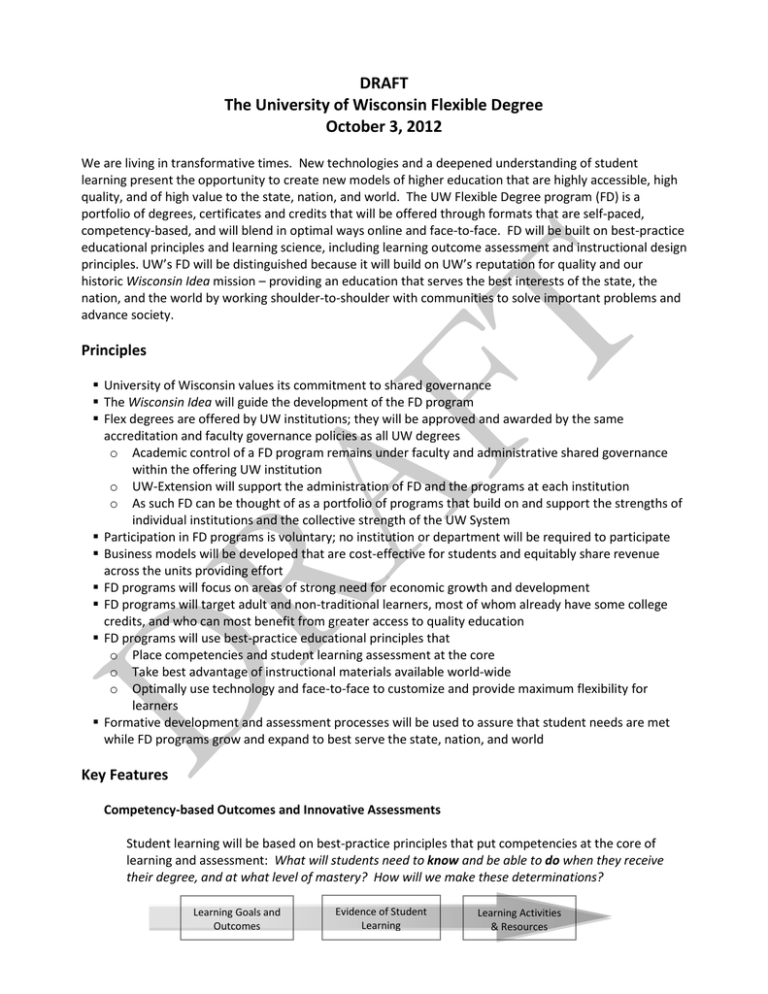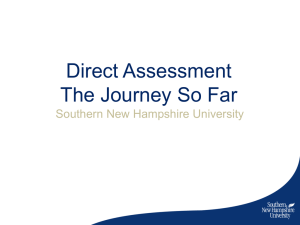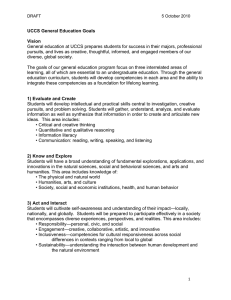DRAFT The University of Wisconsin Flexible Degree October 3, 2012
advertisement

DRAFT The University of Wisconsin Flexible Degree October 3, 2012 We are living in transformative times. New technologies and a deepened understanding of student learning present the opportunity to create new models of higher education that are highly accessible, high quality, and of high value to the state, nation, and world. The UW Flexible Degree program (FD) is a portfolio of degrees, certificates and credits that will be offered through formats that are self-paced, competency-based, and will blend in optimal ways online and face-to-face. FD will be built on best-practice educational principles and learning science, including learning outcome assessment and instructional design principles. UW’s FD will be distinguished because it will build on UW’s reputation for quality and our historic Wisconsin Idea mission – providing an education that serves the best interests of the state, the nation, and the world by working shoulder-to-shoulder with communities to solve important problems and advance society. Principles University of Wisconsin values its commitment to shared governance The Wisconsin Idea will guide the development of the FD program Flex degrees are offered by UW institutions; they will be approved and awarded by the same accreditation and faculty governance policies as all UW degrees o Academic control of a FD program remains under faculty and administrative shared governance within the offering UW institution o UW-Extension will support the administration of FD and the programs at each institution o As such FD can be thought of as a portfolio of programs that build on and support the strengths of individual institutions and the collective strength of the UW System Participation in FD programs is voluntary; no institution or department will be required to participate Business models will be developed that are cost-effective for students and equitably share revenue across the units providing effort FD programs will focus on areas of strong need for economic growth and development FD programs will target adult and non-traditional learners, most of whom already have some college credits, and who can most benefit from greater access to quality education FD programs will use best-practice educational principles that o Place competencies and student learning assessment at the core o Take best advantage of instructional materials available world-wide o Optimally use technology and face-to-face to customize and provide maximum flexibility for learners Formative development and assessment processes will be used to assure that student needs are met while FD programs grow and expand to best serve the state, nation, and world Key Features Competency-based Outcomes and Innovative Assessments Student learning will be based on best-practice principles that put competencies at the core of learning and assessment: What will students need to know and be able to do when they receive their degree, and at what level of mastery? How will we make these determinations? Learning Goals and Outcomes Evidence of Student Learning Learning Activities & Resources Best-practice principles in instructional design begin with competencies, or student learning outcomes: start with learning outcomes, then determine assessment practices, and then develop learning activities and resources. Flexible Degrees will be based on mastery of competencies determined by departments offering the degree. Assessment of mastery will be overseen by program faculty according to sharedgovernance policies. Best practice dictates that competencies themselves are sequenced and modularized, with larger conceptual areas composed of a variety of sub-competencies. Flexible Routes to Achieve Mastery of Competencies The FD model uncouples mastery of competencies from delivery. Students can receive skill and knowledge from anywhere – from traditional place-based courses, to online material, to practical experiences, to structured internships and service projects. What’s important is for students to demonstrate mastery over program competencies. By uncoupling mastery of competencies from delivery, students can customize their education according to prior learning and experiences, their time and effort, and their interests and educational goals. Competencies and Assessments Grounded in the Wisconsin Idea UW’s Flex Degrees will focus on competencies and assessments based on the Wisconsin Idea: the idea that through education, we stand shoulder-to-shoulder with communities to solve problems that are important to the state, the nation, and the world. Flex degrees will focus on areas of strong need for economic growth and development. UW System’s aspirational Shared Learning Goals will be used to direct the development of FD competencies.1 The range and scope of assessments will be developed to best capture the FD competencies – from traditional course-based assessments, to rubric-based assessments of student work products, to demonstrating skills and abilities in structured environments. Please contact Aaron Brower (aaron.brower@uwex.edu; 608-262-6151) with comments and feedback. More information can be found at [URL] 1 http://www.wisconsin.edu/assets/sites/growth_agenda/docs/2009-11/actionsteps/01_LearningGoals.pdf


